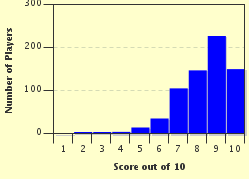Quiz Answer Key and Fun Facts
1. Which condition, normally diagnosed in childhood, is characterized by problems with communication and relating to other people and the sufferer's surroundings, but can present in a wide array of symptoms across a spectrum?
2. Which genetic neurological illness, named for its discoverers, normally leads to death by the age of four?
3. A form of dementia, this disease typically presents in the elderly. It inhibits the patient from being able to remember friends and family, and causes other types of forgetfulness as well. What disease have I just described?
4. Which disease causes the patient to have extreme pain, more than would normally result from minor injuries, so severe that it often spreads to other areas of the body, and can be debilitating?
5. While it affects the cerebellum, the portion of the brain that controls movement, this disease won't turn its sufferers into zombies. What disease can be controlled completely when treated properly?
6. This learning disability causes patients to get words mixed up. What problem presents these symptoms?
7. Which condition presents itself through seizures, which can be controlled by medication for the majority of sufferers?
8. Commonly known as Lou Gehrig's disease, this condition affects the entire body over time. What condition was the famous baseball slugger diagnosed with cutting his career short?
9. Which disease, brought on by a reduction in the dopamine-producing brain cells, caused Michael J. Fox to semi-retire from acting after he was diagnosed with it?
10. Characterized by repetitive and involuntary movements and vocalizations, which disease is almost always diagnosed when a person is in early childhood?
Source: Author
Shadowmyst2004
This quiz was reviewed by FunTrivia editor
rossian before going online.
Any errors found in FunTrivia content are routinely corrected through our feedback system.


